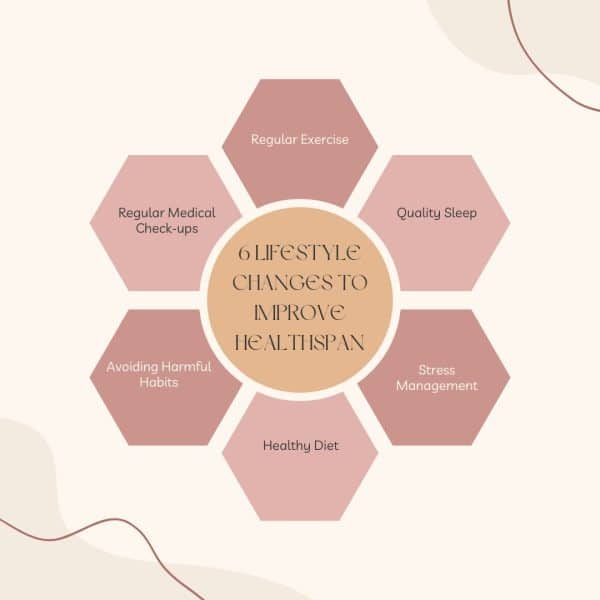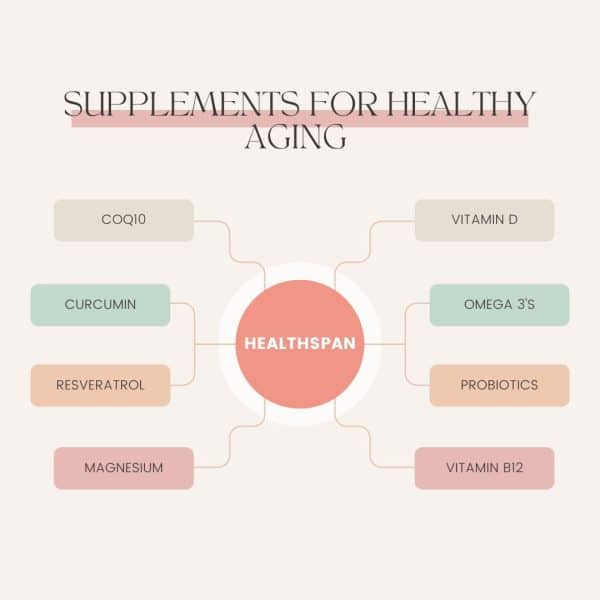Please note: This post contains Amazon affiliate links. As an Amazon Associate, I earn from qualifying purchases. This will in no way impact the price you pay. Affiliate links in this article are denoted with an asterisk (*).
Today, we’re going to talk about something really important: living a long and healthy life.
You might have heard people talking about how we’re living longer these days, but did you know that there’s a difference between just living longer and living those extra years in good health? That’s where the ideas of “healthspan” and “lifespan” come in.
What’s the Difference Between Healthspan vs Lifespan?
Lifespan is pretty simple – it’s the total number of years a person lives from birth to death. But healthspan is all about the years you live while you’re in good health, without any serious illnesses. It’s not just about living a long time, but about living well and enjoying those years.
Why is Healthspan More Important Than Lifespan?
So, why is healthspan more important than lifespan? Well, think about it – what’s the point of living a long life if you’re not healthy enough to enjoy it?
Focusing on healthspan means you’ll have more years where you can do all the things you love, spend quality time with your friends and family, and stay independent.

What Lifestyle Changes Can Help Extend My Healthspan?
Now, let’s talk about some changes you can make in your life to help you live a longer, healthier life:
1. Regular Exercise
Physical activity is a cornerstone of a healthy lifestyle and has many benefits for healthspan:
- Cardiovascular Health: Regular exercise strengthens the heart, improves circulation, and reduces the risk of cardiovascular diseases. Activities such as walking, jogging, swimming, and cycling are excellent for heart health.
- Muscle and Bone Strength: Weight-bearing exercises, like strength training, help maintain muscle mass and bone density, reducing the risk of osteoporosis and fractures.
- Weight Management: Exercise helps maintain a healthy weight, which is crucial for preventing obesity-related diseases such as diabetes, hypertension, and certain cancers.
- Mental Health: Physical activity releases endorphins, which improve mood and reduce symptoms of depression and anxiety. Exercise also enhances cognitive function and reduces the risk of cognitive decline.
- Flexibility and Balance: Activities like yoga and tai chi improve flexibility, balance, and coordination, reducing the risk of falls and injuries.
2. Quality Sleep
Adequate and restful sleep is essential for overall health and longevity.
- Repair and Regeneration: During sleep, the body repairs tissues, regenerates cells, and strengthens the immune system. Quality sleep is crucial for healing and maintaining optimal bodily functions.
- Mental Health: Good sleep supports brain function, improves memory, enhances learning, and reduces the risk of mental health disorders such as depression and anxiety.
- Hormonal Balance: Sleep regulates hormones that control appetite, stress, growth, and metabolism. Disruptions in sleep can lead to hormonal imbalances and health issues, like obesity and diabetes.
- Energy Levels: Restful sleep restores energy levels, improving physical performance and productivity during the day.
3. Stress Management
Chronic stress can have detrimental effects on health. Effective stress management techniques can significantly improve healthspan:
- Mindfulness and Meditation: Practices like mindfulness and meditation help calm the mind, reduce stress, and improve emotional regulation. They also enhance self-awareness and promote a sense of peace.
- Breathing Exercises: Deep breathing exercises can activate the body’s relaxation response, lowering stress levels and improving mental clarity.
- Physical Activity: Exercise is a natural stress reliever. It reduces levels of the body’s stress hormones, such as adrenaline and cortisol, and stimulates the production of endorphins.
- Hobbies and Leisure Activities: Engaging in hobbies and leisure activities provides a break from daily stressors and promotes relaxation and enjoyment.
- Social Support: Connecting with friends, family, and support groups provides emotional support and helps manage stress more effectively.
4. Healthy Diet
A nutritious diet is fundamental to extending healthspan. Here are some dietary principles to follow:
- Whole Foods: Focus on consuming whole, unprocessed foods such as fruits, vegetables, whole grains, lean proteins, and healthy fats. These foods are rich in essential nutrients and antioxidants.
- Balanced Macronutrients: Ensure a balanced intake of carbohydrates, proteins, and fats. Include sources of healthy fats like avocados, nuts, and olive oil, and opt for lean proteins like fish, chicken, and legumes.
- Antioxidant-Rich Foods: Include foods high in antioxidants, such as berries, dark leafy greens, nuts, and seeds. Antioxidants combat oxidative stress and reduce inflammation, which is linked to aging and chronic diseases.
- Fiber: High-fiber foods like whole grains, fruits, vegetables, and legumes support digestive health, regulate blood sugar levels, and help maintain a healthy weight.
- Hydration: Drink plenty of water throughout the day to stay hydrated. Proper hydration supports digestion, nutrient absorption, and toxin elimination.
5. Avoiding Harmful Habits
Certain habits can significantly shorten healthspan. Avoiding these can have a profound impact on your overall health:
- Smoking: Smoking is a major risk factor for many diseases, including lung cancer, heart disease, and respiratory illnesses. Quitting smoking can significantly improve health and extend lifespan.
- Excessive Alcohol Consumption: Drinking too much alcohol can lead to liver disease, cardiovascular problems, and an increased risk of accidents. Moderation is key; limit alcohol intake to recommended levels.
- Drug Use: Avoid recreational drug use, which can lead to addiction, mental health issues, and various physical health problems.
6. Regular Medical Check-ups
Routine medical check-ups are vital for early detection and prevention of health issues:
- Screenings and Tests: Regular screenings for blood pressure, cholesterol levels, blood sugar levels, and cancer can help detect problems early when they are most treatable.
- Vaccinations: Stay up-to-date with vaccinations to prevent infectious diseases.
- Monitoring Chronic Conditions: If you have a chronic condition, regular check-ups help manage the condition effectively and prevent complications.
- Health Counseling: Regular visits to healthcare providers offer opportunities for health counseling, personalized advice, and support for making healthy lifestyle changes.

Can Supplements and Vitamins Help Extend Healthspan?
Supplements and vitamins can play a role in extending healthspan, especially if your diet lacks certain nutrients. Here’s a detailed look at some supplements that are often recommended for improving healthspan and how they contribute to overall health:
1. Multivitamins
Multivitamins provide a broad range of essential vitamins and minerals that support various bodily functions. They are especially useful for filling nutritional gaps in your diet. Key benefits include:
- Immune Support: Vitamins A, C, and D, along with minerals like zinc, strengthen the immune system. One I like for immune support is Immucare * by Natura Health Products.
- Bone Health: Calcium and vitamin D are crucial for maintaining strong bones.
- Energy Levels: B vitamins help convert food into energy, keeping you active and alert.
2. Vitamin D
Vitamin D is essential for bone health, immune function, and reducing inflammation. Many people are deficient in this vitamin, especially in regions with limited sunlight. Benefits include:
- Bone Health: Promotes calcium absorption, essential for strong bones and teeth.
- Immune Function: Enhances pathogen-fighting effects of monocytes and macrophages.
- Mood Regulation: May improve mood and reduce the risk of depression.
3. Omega-3 Fatty Acids
Omega-3 fatty acids, found in fish oil, flaxseeds, and walnuts, are vital for brain and heart health. Key benefits include:
- Heart Health: Reduce the risk of heart disease by lowering triglycerides, blood pressure, and inflammation.
- Brain Function: Essential for cognitive function and may help protect against Alzheimer’s disease.
- Anti-Inflammatory: Reduce inflammation, which is linked to chronic diseases like arthritis.
4. Probiotics
Probiotics* are beneficial bacteria that support gut health, which is linked to overall well-being. Benefits include:
- Digestive Health: Help balance the gut microbiome, improving digestion and nutrient absorption.
- Immune Support: Strengthen the gut barrier and enhance immune response.
- Mental Health: May reduce symptoms of depression and anxiety by improving gut-brain communication.
5. Antioxidants
Antioxidants like vitamin C *, vitamin E, and CoQ10 help reduce oxidative stress and combat free radicals, which contribute to aging and chronic diseases. Benefits include:
- Skin Health: Protects skin from damage caused by UV rays and pollution.
- Heart Health: Prevents the oxidation of LDL cholesterol, reducing the risk of heart disease.
- Cellular Health: Supports the repair and regeneration of cells, maintaining overall health.
6. Vitamin B12
Vitamin B12 is crucial for nerve function, red blood cell production, and DNA synthesis. Many older adults are deficient in B12, which can lead to cognitive decline and anemia. Benefits include:
- Energy Production: Helps convert food into energy.
- Nerve Health: Maintains healthy nerve cells and supports neurological function.
- Red Blood Cell Formation: Essential for the production of red blood cells and preventing anemia.
7. Magnesium
Magnesium supports loads of bodily functions, including muscle and nerve function, blood glucose control, and bone development. One of my favorites is Magnesium 300 * by Innate Response. Benefits include:
- Bone Health: Works with calcium to maintain bone density.
- Heart Health: Regulates heartbeat and supports cardiovascular function.
- Muscle Function: Prevents muscle cramps and supports muscle relaxation.
8. Resveratrol
Resveratrol is a compound found in red wine, grapes, and certain berries. It has gained attention for its potential anti-aging properties. Benefits include:
- Heart Health: Protects against heart disease by reducing inflammation and preventing the oxidation of LDL cholesterol.
- Longevity: Activates certain genes associated with longevity.
- Brain Health: May protect brain cells from damage and reduce the risk of neurodegenerative diseases.
9. Curcumin
People recognize curcumin, the active compound in turmeric, for its powerful anti-inflammatory and antioxidant properties. Benefits include:
- Anti-Inflammatory: Reduces inflammation, which is linked to many chronic diseases.
- Joint Health: Alleviates symptoms of arthritis and joint pain.
- Brain Health: May improve memory and reduce the risk of brain diseases.
10. Coenzyme Q10 (CoQ10)
CoQ10 is an antioxidant that plays a crucial role in energy production within cells. The body naturally produces it, but levels decline with age. Benefits include:
- Heart Health: Improves symptoms of heart failure and reduces oxidative damage.
- Energy Production: Enhances mitochondrial function, boosting energy levels.
- Skin Health: Protects skin cells from damage and improves skin health.
While supplements and vitamins can help extend healthspan by addressing nutritional deficiencies and supporting overall health, they are most effective when combined with a healthy diet and lifestyle.
It’s important to consult with a healthcare provider — like your friendly local dietitian — before starting any new supplement regimen, as individual needs vary and some supplements can interact with medications.

What Role Do Social Connections and Community Play in Healthspan?
Another really important part of living a healthy life is having strong social connections and being part of a community. Several studies have shown that strong social ties can significantly affect physical, mental, and emotional health, ultimately contributing to a longer and healthier life.
Let’s dive into the specific ways social connections and community involvement can boost healthspan.
1. Mental Health Benefits
Strong social connections are crucial for maintaining mental health. Here’s how:
- Reduced Risk of Depression and Anxiety: Regular social interactions can ease feelings of loneliness and isolation, which are common contributors to depression and anxiety. Engaging with friends, family, and community groups provides emotional support and a sense of belonging.
- Improved Cognitive Function: Social engagement keeps the brain active and challenged. Activities such as conversations, playing games, and taking part in group events stimulate cognitive processes and help maintain mental acuity.
- Stress Reduction: Sharing concerns and discussing problems with trusted individuals can provide relief from stress. Emotional support from social networks can act as a buffer against life’s challenges, reducing overall stress levels.
2. Physical Health Benefits
Social connections also play a significant role in physical health:
- Encouragement of Healthy Behaviors: Being part of a social network can influence individuals to adopt healthier lifestyles. Friends and family can encourage each other to exercise regularly, eat healthily, and avoid harmful habits like smoking and excessive drinking.
- Enhanced Immune Function: Positive social interactions can boost the immune system. Studies have shown that people with strong social ties have lower levels of inflammation and are less susceptible to illnesses.
- Longevity: Research has consistently shown that people with robust social connections live longer. The emotional and physical support provided by social networks contributes to overall well-being and longevity.
3. Emotional Well-being
Emotional well-being has a close connection to social connections.
- Sense of Belonging: Being part of a community provides a sense of belonging and purpose. Feeling connected to others and knowing that others value you can significantly enhance emotional health.
- Positive Outlook: Interacting with others and sharing experiences can foster a positive outlook on life. Social connections can provide joy, laughter, and a sense of fulfillment, contributing to overall happiness.
4. Community Involvement
Involvement in community activities can further enhance healthspan:
- Volunteering: Volunteering provides a sense of purpose and fulfillment. Helping others can boost self-esteem, reduce stress, and improve overall mental health. It also provides opportunities for social interaction and building new relationships.
- Group Activities: Group activities, such as clubs, sports, and classes, encourage physical activity, mental engagement, and social interaction. These activities can improve both physical and mental health.
- Support Groups: Being part of a support group for specific issues (e.g., health conditions, caregiving, or grief) can provide a platform to share experiences, gain advice, and find comfort in knowing others are going through similar situations.
5. Role of Technology
Technology can also help maintain social connections, particularly for those with isolating health or mobility issues.
- Social Media: Platforms like Facebook, Twitter, and Instagram can help people stay connected with friends and family, share experiences, and find support groups.
- Video Calls: Apps like Zoom, Skype, and FaceTime allow for face-to-face interactions, which can be more engaging and fulfilling than phone calls or text messages.
- Online Communities: Forums and online communities provide opportunities to connect with people who share similar interests or experiences, offering support and fostering a sense of community.
6. Intergenerational Connections
Building connections across different age groups can also enhance healthspan:
- Family Ties: Strong family relationships provide a support system and a sense of continuity. Engaging with younger family members can keep older adults active and mentally stimulated, while younger generations can benefit from the wisdom and experience of their elders.
- Mentoring: Older adults can find purpose and fulfillment in mentoring younger individuals, sharing their knowledge and experience, and contributing to the community.
Social connections and a sense of community are vital components of a healthy and fulfilling life. When you have good friends, family, and people around you who care about you, it can make a big difference in your mental and physical health.
Doing things like volunteering, joining clubs or groups, and staying connected with loved ones can all help you live a happier, healthier life.
Are There Specific Regions or Populations With Longer Healthspans, and What Can We Learn From Them?
Did you know that there are even certain parts of the world where people tend to live longer and healthier lives? These places are called “Blue Zones,” and they include places like Okinawa in Japan, Sardinia in Italy, and Loma Linda in California.
The people in these areas often eat lots of plant-based foods, stay active, have strong social connections, and find ways to reduce stress. If they can do it, so can you!
Conclusion
So, there you have it! Living a long, healthy life is all about making good choices every day – eating well, staying active, managing stress, avoiding harmful habits, and keeping a connection with others.
By focusing on your healthspan, you’ll be setting yourself up for a life full of fun, happiness, and good health. Remember, it’s not just about living longer, but about living better!
Embrace these changes and aim not just for a long life, but for a life well-lived, filled with health and vitality.
***Disclaimer: This post is for informational purposes only and should not be construed as medical advice***


